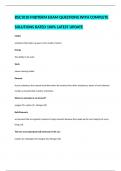-
1. Exam (elaborations) - Bsc1010 ch 5 exam questions and verified correct answers. latest update
-
2. Exam (elaborations) - bsc 1010 exam questions and answers with complete solutions verified and rated 100% ...
-
3. Exam (elaborations) - Bsc 1010 exam questions and answers with complete solutions verified and grade a++
-
4. Exam (elaborations) - Bsc 1010 exam 1 actual questions and answers with complete verified solutions latest ...
-
5. Exam (elaborations) - Bsc 1010 study guide exam questions and answers with complete verified solutions
-
6. Exam (elaborations) - Bsc 1010 exam 1 questions and answers with complete solutions rated 100% passed!!!
-
7. Exam (elaborations) - Bsc1010 exam 1 questions and answers with complete solutions 100% verified latest upd...
-
8. Exam (elaborations) - Bsc1010 actual exam questions with complete verified correct answers latest update 20...
-
9. Exam (elaborations) - Bsc 1010 lab exam questions and answers with complete solutions verified 100% already...
-
10. Exam (elaborations) - Bsc1010 final exam questions and answers with complete solutions verified rated 100% ...
-
11. Exam (elaborations) - Bsc 1010 cell communication exam questions and answers with complete solutions latest...
-
12. Exam (elaborations) - Bsc 1010 exam one exam questions and answers with complete solutions verified 100% pa...
-
13. Exam (elaborations) - Bsc1010 ch. 3 quiz exam questions and answers with complete 100% verified solutions
-
14. Exam (elaborations) - Bsc1010 chapter 1 exam questions and answers latest update
-
15. Exam (elaborations) - Bsc 1010 chapter 4 review exam questions and answers with complete solutions verified...
-
16. Exam (elaborations) - Bsc1010 ch. 2 exam questions and verified answers rated passed!!! latest update
-
17. Exam (elaborations) - Chapter 4 bsc1010 exam questions and answers with complete solutions verified rated 1...
-
18. Exam (elaborations) - Lecture 3 bsc1010 exam questions and complete answers rated 100%
-
19. Exam (elaborations) - Lecture 1 bsc1010 questions and answers with complete solutions latest update
-
20. Exam (elaborations) - Bsc 1010 exam questions and answers with complete solutions 100% verified graded a++
-
21. Exam (elaborations) - Bsc1010 actual exam questions and answers with complete solutions 100% verified guara...
-
22. Exam (elaborations) - Bsc 1010 final exam questions and answers with complete solutions verified guaranteed...
-
23. Exam (elaborations) - Bsc 1010 chapter 3 review exam questions and answers with complete solutions verified...
-
24. Exam (elaborations) - Bsc 1010- ch 6 exam questions and answers with complete solutions rated 100% graded a...
-
25. Exam (elaborations) - Walter bsc1010 exam questions and answers with complete solutions 100% verified lates...
-
26. Exam (elaborations) - Bsc1010 exam1 questions and answers with complete solutions verified rated 100% guara...
-
27. Exam (elaborations) - Bsc1010 final exam questions and answers with complete solutions verified rated 100% ...
-
28. Exam (elaborations) - Mastering bsc1010: chapter 3 exam questions with complete solutions verified rated 10...
-
29. Exam (elaborations) - Bsc1010 chapter 6 exam questions with complete solutions verified 100% verified
-
30. Exam (elaborations) - Bsc 1010 lab final exam questions with complete solutions latest update
-
31. Exam (elaborations) - Bsc1010 midterm exam questions with complete solutions rated 100% latest update
-
32. Exam (elaborations) - Bsc1010 2.5 vocabulary exam questions with complete solutions verified.
-
33. Exam (elaborations) - Bsc 1010 final exam questions with complete solutions 100% verified
-
34. Exam (elaborations) - Bsc1010 lee liang exam questions with complete solutions verified.
-
35. Exam (elaborations) - Bsc 1010 unit 1 exam questions with complete solutions latest update
-
36. Exam (elaborations) - Bsc1010 exam 2 questions and answers with complete solutions verified latest update 2...
-
37. Exam (elaborations) - Bsc1010 chapter 7 exam questions and answers with complete solutions latest update 20...
-
38. Exam (elaborations) - Bsc1010 exam 2 questions and answers with complete solutions rated 100% guaranteed pa...
-
39. Exam (elaborations) - Bsc1010 ch.6 energy and metabolism exam questions and answers with complete solutions...
-
40. Exam (elaborations) - Bsc 1010 lab midterm exam questions with complete solutions latest update
-
41. Exam (elaborations) - Bsc1010 ch 3-4 exam questions with complete solutions verified rated 100% 2024/2025
-
42. Exam (elaborations) - Bsc1010 fsw slisher exam questions and answers with complete solutions verified
-
43. Exam (elaborations) - Bsc1010 ch 10: genetics exam questions with complete solutions verified rated 100%
-
44. Exam (elaborations) - Bsc1010 8.5 vocabulary exam questions with complete solutions latest verified 100%
-
45. Exam (elaborations) - Bsc 1010 pensacola state college exam questions with complete solutions latest update...
-
46. Exam (elaborations) - Bsc 1010 lab #4: chemistry of life exam questions and verified answers
-
47. Exam (elaborations) - Bsc 1010 exam 1 study guide questions and answers with complete solutions verified
-
48. Exam (elaborations) - Bsc1010 chapter 22 testbank exam questions and answers with complete solutions guaran...
-
49. Exam (elaborations) - Bsc1010 fsw final 19 exam questions with complete solutions verified latest update
-
50. Exam (elaborations) - Eukaryotic cells bscs1010 exam 2 questions and answers with complete solutions
-
51. Exam (elaborations) - Bsc1010 chapter 7: respiration (how cells harvest energy) exam questions and answers ...
-
Show more




